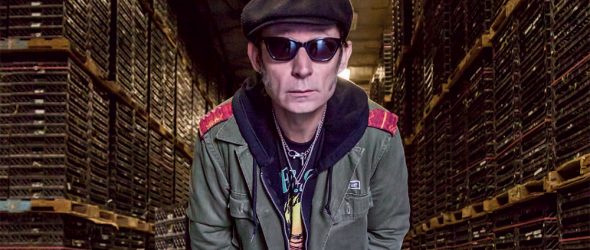 https://cannabisexaminers.com/wp-content/uploads/2020/04/mike-dirnt-goldenseed-marijuana-investor.jpg
https://cannabisexaminers.com/wp-content/uploads/2020/04/mike-dirnt-goldenseed-marijuana-investor.jpg
Mike Dirnt’s plate is full this year. Green Day just released its first album since 2016, the saltily titled “Father of all Motherfuckers,” and the bassist is scheduled to head out on a summer-long stadium tour with Weezer and Fall Out Boy — although that looks increasingly unlikely due to the coronavirus pandemic. He also has a harvest to take pride in.
Dirnt is an investor, brand ambassador and marketing expert for Goldenseed, which owns a 100-acre farm outside Santa Cruz. A portion of the land is devoted to growing cannabis and hemp for both the recreational and medicinal market.
The Bay Area native has personal experience with the plant’s healing qualities, as his wife, Brittney Cade, used it to combat the effects of chemotherapy during treatment for breast cancer. “She couldn’t drink or eat and was constantly nauseous,” Dirnt tells Variety. “The difference after she started taking these pot pills was like night and day. There was light at the end of the tunnel.”
The company’s founder and CEO is real estate developer and construction veteran Scott Goldie, who four years ago bought a sprawling nursery in Central California that produced houseplants for such retailers as Trader Joe’s. Building the business from 900,000 plants to 5 million allowed him the financial freedom to invest in growing cannabis and, for the CBD market, hemp.
“There’s just limitless potential,” says Dirnt, whose entrepreneurial experience comes from the band’s Oakland Coffee company and owning a rock ’n’ roll diner in the area. “Of course, the teenager in me would be, like, ‘Fuck, yeah.’ But our goal is to get cannabis to the point where it’s not taboo. The plant is like bamboo in Asia; it has so many different uses.”
Dirnt was particularly impressed with the grow’s sustainable methods — there’s a 1-acre worm farm onsite that allows production of compost tea and plant nutrients. “It all starts with the dirt,” he says. “You want to grow in scale, but in a more responsible way. We’ve built this on a solid model.”
Goldenseed products are in 85 California dispensaries, with both flower and pre-rolls available for purchase. Dirnt recommends the Sunset Sherbet indica hybrid pre-rolls with terpene chips, winner of the High Times NorCal Cannabis Cup and Hempcon.
The business also made news recently as the first company given permission by the Federal Trade Commission to offer shares to the public, though the law still prohibits it from being listed on the New York Stock Exchange, even as some cannabis companies are allowed on the Canadian exchange.
The current campaign is offering 25 million shares at $10 apiece (valuing the company at $250 million) — with a 10-share, $100 minimum providing a princely .0004 of the company. According to Dirnt, the company has already attracted more than 600 investors in 40 states and 13 countries as far away as Kenya. “Even my sister acquired some shares, so it’s cool to be in business with family,” he adds,
Another aspect of soliciting shareholders is to create a nationwide network of invested brand ambassadors, which is part of what initially attracted Goldenseed’s Goldie to Dirnt.
“Working with people like Mike raises our profile,” says Goldie. “He’s not just a token celebrity for us. He’s an investor and he’s critically involved in the company. He’s advising us on marketing strategy, logos, labeling and packaging. He’s very creative; he knows how to launch a brand. Just look at his music career. He knows how to get it out there and be very successful.”
“I’m in Green Day, so I definitely have a strong history with pot,” cracks Dirnt, but he also points to less-obvious attributes to legalization. “Growing up, my parents both smoked and drank. But I remember, as a kid, their big fights were when they were drunk, not stoned.”
Goldenseed’s Goldie compares his cannabis investment to “buying into the Napa wine industry in the 1970s,” relying on California’s reputation as a premium source of marijuana to support his brand. But just in case regulatory hassles continue to slow the legal THC business, Goldie has set aside a portion of his land to produce hemp, believing that CBD, now essentially legal everywhere, will show the greatest growth after the novelty of recreational bud inevitably wears off. In fact, he points to California’s $8 billion black market (compared to $3 billion legal) as one of the variables in the industry’s continued upward trajectory.
“CBD can now be sold around the world without restrictions,” says Goldie, who will supply hemp to a Minneapolis company that sells products in Target stores. He says the objective of the current offering, aside from raising capital, would be to increase its marketing budget and expand the physical facilities while reducing debt. The ultimate goal is to either build the business to where they can sell at a profit, eventually get listed on a stock exchange or, best-case scenario, pay out dividends.
“This isn’t about making the strongest crack,” says Dirnt. “We’re using sun and water, using regionally sourced compost, the location is beautiful. What you put into the plant is passed on. You need to treat it right from the ground up.”

